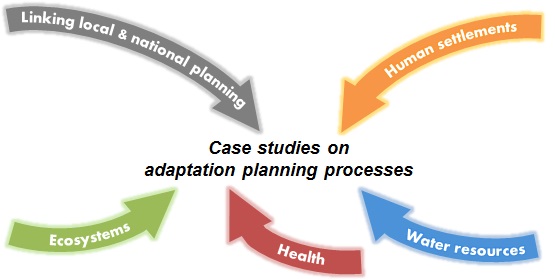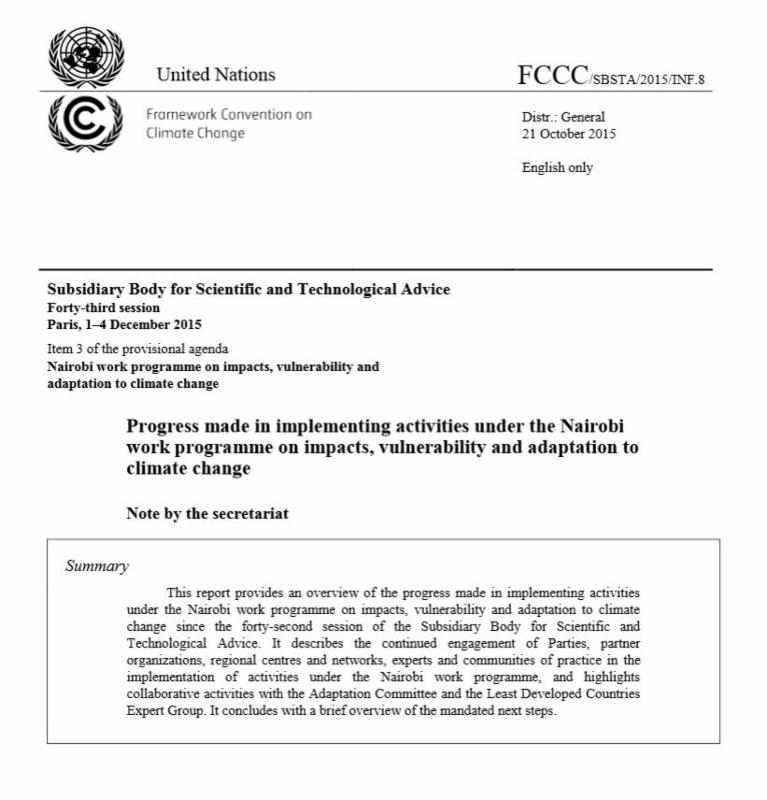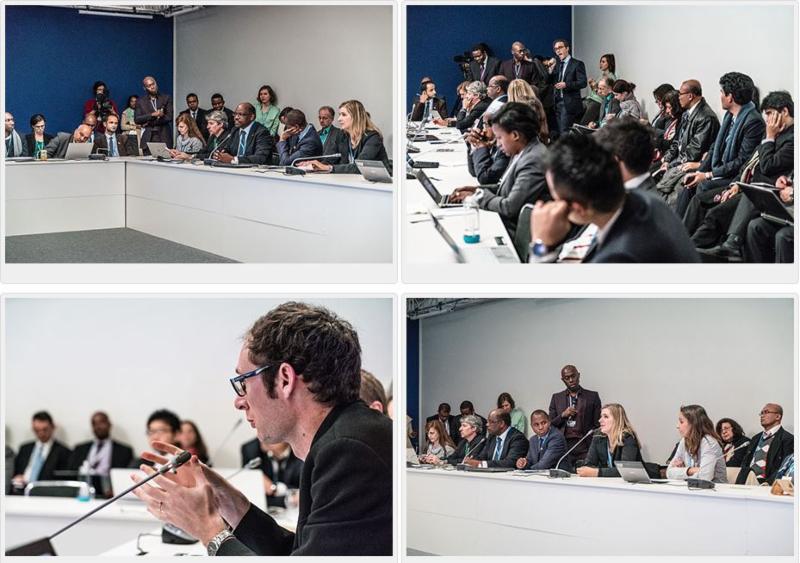|
| Welcome to the December edition of the UNFCCC Nairobi work programme (NWP) eUpdate |
|
|
- Documents considered by SBSTA 43
- Good practices and lessons learned on adaptation planning processes: a synthesis report
- Progress made in implementing activities under the NWP
- Key outcomes from 43rd session of the SBSTA
- The 9th Focal Point Forum
|
|
|
- Progress update on the Lima Adaptation Knowledge Initiative (LAKI)
- LAKI priority-setting workshop in the Southern Africa subregion
- LAKI side event during COP 21
- New presentational material on NWP
|
|
|
- New NWP partners
- The NWP Adaptation Knowledge Portal
- Adaptation Committee's documentary
- Internship opportunities with the Adaptation Programme
|
|
 NWP at COP21
NWP at COP21
|
|
Documents considered by SBSTA 43
|
| Good Practices and Lessons Learned on Adaptation Planning Processes: a synthesis report |

The synthesis report provides an overview of the 170 case studies contributed by Parties and partner organizations
on:
- available and implemented tools and methods for adaptation planning processes addressing ecosystems, human settlements, water resources and health;
- good practices and lessons learned in relation to adaptation planning processes, including monitoring and evaluation; and
- good practices and lessons learned in relation to processes and structures for linking national and local adaptation planning.
The report also highlights the key common elements amongst the good practices and lessons learned related to the four thematic areas, as well as on linking national and local adaptation planning, including gaps in relation to the provision and dissemination of information and knowledge, which could be considered as a basis for possible next steps in the context of the NWP.
|
 |
 Progress made in implementing activities under the NWP
Progress made in implementing activities under the NWP
The
progress report provides an overview of the progress made in implementing activities under the NWP since SBSTA 42 (June 2015). The report describes the continued engagement of Parties, partner organizations, regional centres and networks, experts and communities of practice in the implementation of activities under the NWP. It highlights the collaborative activities undertaken with the Adaptation Committee (AC), the Least Developed Countries Expert Group (LEG), and NWP partner organizations.
The report includes graphics detailing the profile of NWP partners and action pledges, as well as statistics on the NWP partner organizations. It concludes with a brief overview of the mandated next steps.
|

Key outcomes from 43rd session of SBSTA
Key elements in
SBSTA 43 conclusions
on NWP adopted in Paris include:
- Recognizing the collaboration with the Adaptation Committee (AC) and the Least Developed Countries Expert Group (LEG) in preparation of the synthesis of case studies on good practices and lessons learned in adaptation planning processes, addressing ecosystems, human settlements, water resources and health, and in processes and structures for linking national and local adaptation planning, and that these collaborative activities have led to stronger linkages between the NWP, the AC and the LEG.
- Acknowledging the valuable information exchange among Parties and NWP partner organizations that took place at the 9th NWP Focal Point Forum, organized in conjunction with SBSTA 43, and the valuable substantive inputs from the AC, the LEG and experts from NWP partner organizations in the organization of the Forum, with a further request to the secretariat, under the guidance of the Chair of the SBSTA, to continue to collaborate with interested Parties and relevant partner organizations.
- Welcoming the commitment of UNEP, through its Global Adaptation Network, to implementing the Lima Adaptation Knowledge Initiative in other subregions in 2016, in response to the conclusions of SBSTA 41.
- Welcoming the launch of the Adaptation Knowledge Portal under the NWP and recognizing its role in enhancing the dissemination of knowledge developed under the NWP, the AC and the Executive Committee of the Warsaw International Mechanism for Loss and Damage associated with Climate Change Impacts, including contributions made by Parties, partner organizations and regional centres and networks.
|
 The 9th NWP Focal Point Forum
The 9th NWP Focal Point Forum
The
9th Focal Point Forum was successfully held on 30th November in Paris, France, in conjunction with COP 21. Through a rich and interactive exchange among over 70 participants from both Parties and NWP partner organizations, the Forum focused on effective ways
to facilitate learning on adaptation that can be promoted under the NWP and through the systematic documentation and dissemination of good adaptation practices and lessons learned.
Click
here
to learn more about the details of the Forum including the agenda, presentations made and key outcomes.
|
|
Call for inputs to the eUpdate
The Nairobi work programme invites NWP partners to share information on adaptation events they organized and publications they released during COP 21 to be featured in the next eUpdate (March 2016). Please contact us at nwp(at)unfccc.int.
|
 NWP AS A KNOWLEDGE HUB NWP AS A KNOWLEDGE HUB
|

Progress update on the implementation of the Lima Adaptation Knowledge Initiative (LAKI)
|
 |
|
The priority-setting workshop for the Southern Africa subregion
As part of the implementation of the Lima Adaptation Knowledge Initiative (LAKI), SouthSouthNorth, a NWP partner organization, collaborated with UNEP and UNFCCC secretariat in organizing the priority-setting workshop for the Southern Africa subregion held on 16-18 November 2015 in Johannesburg, South Africa. The purpose of this workshop was to identify and prioritize adaptation knowledge gaps and a preliminary list of response actions and associated institutions for addressing these gaps in the subregion.
Using four criteria for prioritizing knowledge gaps: sustainability, scale of positive impact on closing the gap, urgency and cross-disciplinary nature of gap, ten expert participants (multidisciplinary stakeholder group - MSG) discussed and agreed to the pool of 16 priority adaptation knowledge gaps for the Southern Africa subregion through a multi-criteria analysis approach.
The MSG also provided a preliminary identification of potential response actions (in terms of concrete deliverables and target users) to address this pool of priority knowledge gaps and also provided pointers as to the best placed organizations to undertake such responses.
The list of priority knowledge gaps for the Southern Africa subregion is available here.
The LAKI side event at the margin of COP 21
The United Nations Environment Programme (UNEP), co-convener of the LAKI, organized a side event on the 3rd December in the Africa Pavilion, to disseminate information on the implementation of the LAKI, in particular the outcomes of the priority-setting workshop of the LAKI for the Southern Africa subregion.
Through the interactive exchange with panelists, comprising representatives from the UNFCCC secretariat, UNEP, SouthSouthNorth (subregional coordination entity for the Southern Africa subregion) and Abu Dhabi Global Environmental Data Initiative (subregional coordination entity for the Gulf Cooperation Council subregion), several points emerged, such as usefulness and uniqueness of the LAKI in responding to adaptation knowledge needs through subregional lens; importance of learning and sharing the outcomes, including comparison of priority knowledge gaps across subregions where the LAKI is implemented; relevance of linking the LAKI work to the national level. Several countries and organizations also expressed their interest and willingness to collaborate in implementation of the LAKI in other subregions.
|
New presentational materials on NWP
The following two sets of presentations have been made available on the
NWP webpage
:
- Overview of the Nairobi work programme, including its objective, evolution, operating context, mandates and modalities; and
- Technical work carried out under the Nairobi work programme.
|
|
NWP AS AN ENGAGEMENT TOOL
|

 New NWP Partners
New NWP Partners
Since the release of the last edition, the following six organizations have since joined the NWP as its new partners:
Southern Voices on Adaptation
is a coalition of climate networks and partners in the global south which aims to promote effective and equitable adaptation to climate change. They are currently developing a code of good practice for national adaptation planning, the
Joint Principles for Adaptation
, currently being piloted in 12 countries.
SouthSouthNorth
assists governments, the private sector and research institutions in understanding the economic, social and environmental choices that climate change presents. They are currently engaged in programmes in both Africa and Latin America that look at providing an alternative to the business-as-usual development path associated with high greenhouse gas emissions.
The Rockies Institute, a
not-for-profit organization
located in the Canadian Rocky Mountains, aims to increase the knowledge and capabilities of individuals, businesses, and communities to build resiliency and adapt to a changing environment.
The
Yale University Science Communications with Impact Network
aims to advance and build climate and sustainability knowledge co-production ecosystems; bridging multiple science networks with business, government, policy, religious and media stakeholders across the public and private sectors; and facilitating communications among them.
The South African National Biodiversity Institute (SANBI) leads and coordinates research, and monitors and reports on the state of biodiversity in South Africa. The institute provides knowledge and information, gives planning and policy advice and pilots best-practice management models in partnership with stakeholders. SANBI is also the South African National Implementing Entity of the Adaptation Fund.
Adaptation at Scale in Semi-Arid Regions aims to better understand what enables widespread, long-term & effective adaptation for the semi-arid regions of Africa & Asia. ASSAR is working with a wide range of stakeholders in these regions to examine the dynamics and drivers of this vulnerability, while exploring ways to promote the resilience of people, local organisations and governments.
ASSAR recently held its first webinar on adaptation and wellbeing, exploring the effectiveness of different communications methods as learning tools.
|

The Adaptation Knowledge Portal
under the NWP
The launch of the Adaptation Knowledge Portal at SBSTA 43 comes after a year-long effort in creating an online platform where users have easy access to information and knowledge - the ones that have been generated under the NWP since its inception in 2005 with inputs and contributions made by NWP partners, and under other adaptation workstreams under the Convention. The design of the portal is guided by the goal to enable comprehensive and targeted queries on information that is relevant to the users' needs. The portal integrates databases, case studies and tools, knowledge resources that are previously hosted under the NWP web pages, along with the more recent inputs.
SBSTA 43 welcomed the launch of the Adaptation Knowledge Portal and recognized its role in enhancing the dissemination of knowledge developed under the NWP, the AC and the Executive Committee of the Warsaw International Mechanism for Loss and Damage associated with Climate Change Impacts, including contributions made by Parties, NWP partner organizations and regional centres and networks.
|
Adaptation Committee's documentary: "Adapting to a changing climate" now available in 9 languages
The Adaptation Committee would like to invite you to view and share their
20-minute documentary
, "Adapting to a changing climate". The documentary aims to introduce viewers to the topic of climate change adaptation by presenting inspiring stories of action alongside a series of expert interviews.
In addition to the English version, subtitled versions in 8 languages including
Arabic
,
Bengali
,
Chinese
,
French
,
Hindi
,
Portuguese
,
Russian
, and
Spanish
, have now been released. For a high-quality copy of the documentary please contact the
Adaptation Committee
, and for more information on the documentary itself click
here
.
|
Internship opportunities with the UNFCCC Adaptation Programme
Students currently enrolled in a Master's or a PhD programme and interested in gaining experience on climate change adaptation issues could apply for the UNFCCC's internship programme and be considered for internship opportunities with the Adaptation Programme. Prospective interns should be currently enrolled in recognized university course of study at the time of application and during the entire period of internship. Should you know of any interested and prospective interns, additional information and application procedures are available
here.
|
|
|
 |
 |
|
|